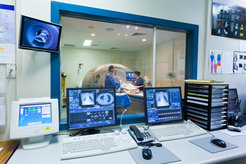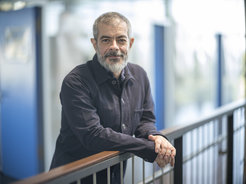
Body-Brain Cybernetics
The Body-Brain Cybernetics Department aims to study the neural connections that enable communication between the brain and various organs in the body. The long-term goal is to develop ways to tap into neural circuits in order to overcome emotional and immunological disorders.
The department will be divided into two main sections: one dedicated to using rodent models and the other focusing on experiments involving human subjects. Within each section, there will be two research groups, each concentrating on distinct but interrelated research areas. The studies will concentrate on a defined set of circuits that are conserved across species. The ultimate goal is to understand how neural circuit modulation can be applied to overcome emotional and related immune disorders in humans. We are particularly interested in pathological fear and disgust, two subjective states that negatively impact on behavior and immunity.
Human Research

In the Human Research section, we will use functional imaging in combination with cognitive and psychological designs to explore the functions of specific amygdalar and lateral hypothalamic neurons in the human brain implied in generating the feelings of fear and disgust. We will also focus on developing stimulation and recording approaches during open neurosurgery in these human brain regions. Building on our Department's prior discoveries in rodents, the goal is to uncover analogous functions in the human brain.
Rodent Models
In the Rodent Models section, one group will explore the circuit mechanisms through which psychological states influence peripheral tissues, i.e., the microbiome and mucosal immunity. This involves investigating the roles of amygdalar and lateral hypothalamic neurons in processing body signals and providing feedback commands. We are particularly interested in the roles of these areas in generating/canceling responses of disgust and uneasiness. The second group will focus on cortical representations of body systems, aiming to identify neuronal groups responsible for conscious representations of the internal body.
About Ivan de Araujo

Ivan de Araujo studied philosophy and mathematics at the University of Brasilia, followed by postgraduate studies in the field of artificial intelligence at the University of Edinburgh. He received his doctorate (DPhil) in experimental psychology and medical imaging from the University of Oxford. As a postdoctoral researcher in neurobiology at Duke University Medical Center, he started to identify neural pathways allowing the digestive tract to influence motivated behaviors. From 2007 to 2018, he directed the Neurobiology of Feeding Laboratory at Pierce Labs (Yale University) before moving to the Icahn School of Medicine at Mount Sinai Hospital in August 2018.
Since May 2023, Ivan de Araujo has been Director at the Max Planck Institute for Biological Cybernetics and Scientific Member of the Max Planck Society.
Major Publications
Zhang T, Perkins MH, Chang H, Han W, de Araujo IE. An inter-organ neural circuit for appetite suppression. Cell. 2022 185(14):2478-2494
Tellez LA, Medina S, Han W, Ferreira JG, Licona-Limón P, Ren X, Lam TT, Schwartz GJ, de Araujo IE. A gut lipid messenger links excess dietary fat to dopamine deficiency. Science. 2013 341(6147):800-2

